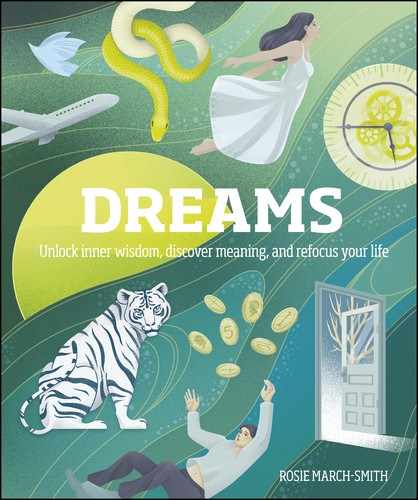
24
DREAM
INTERPRETATION
THROUGH THE
AGES
Dreams must have been around for millennia
but were rst recorded when early civilizations
were at their height. We know little of
prehistory—though there are beautiful cave
paintings all over the world, still being
discovered. Yet they have kept their secrets.
We may never learn if the vividly colored
animal murals were inspired by the artists’
dreams or plans for tomorrow’s hunt.
US_024-025_Through_the_ages.indd 24 04/06/2019 11:14

25
The ancient Egyptians, however, did reveal their
dreams because they had the motivation to do
so and the skills to describe them. But they—
like other ancient races before and after
them—regarded dreams mainly as signposts
for the quality of life in their outer world. They
had yet to explore the life of the inner world.
That was to come thousands of years later.
Early forms of dream interpretation
The Egyptians produced the rst ever book on
dreams. Made of papyrus and discovered in
sandy ruins near the Nile, The Egyptian Book of
Dreams was written nearly 3,000 years ago, yet
with no reference to the hidden depths of the
mind. The Greeks and Romans were big on
omens and portents, too. Psychologists today
would chuckle at the priests’ checklist of
symbols and interpretations. But we must
remember that symbols were tailored to the
times. Seers were employed to look for good or
bad fortune ahead for their masters.
One thousand years before that, the Chinese
were placing great store on dreams as well. But
they viewed them more as a means to explore
the vast world of spirit, not as a representation
of their own destinies or spiritual development.
Limited accounts trickling down through the
centuries sound more philosophic in content:
“Is the dreamer seeing a buttery, or a sleeping
buttery seeing the dreamer?” They were
hardly a guide to self-help.
Bad omens
Our ancient ancestors’ recorded dreams were
polarized in their narratives, delivered in
simplistic terms—success or failure. For
example, in The Egyptian Book of Dreams, red
ink on papyrus denoted bad tidings: red being
the color of bad omens then. The Hebrews
thought along the same lines, also not yet
ready for the subtleties of dreams as we know
them today. Only the aboriginal cultures
embraced the spiritual concept of oneness with
the world, understanding that everything and
everyone was imbued with spirit, an invisible
energy that connected all.
Somehow, a split occurred in civilizations
where spiritual power was ascribed to unseen
gods ruling from afar and making decisions for
the people. Gone was the prehistoric sense of
oneness with the universe, a joyous connection
between the inner and outer world.
Its disappearance over the centuries was to
cause catastrophic results, such as religious
wars. That split from personal/divine power to
divine monopoly was a serious loss, despite
society’s giant technological strides.
“
THE EGYPTIANS PRODUCED
THE FIRST EVER BOOK
ON DREAMS.
”
US_024-025_Through_the_ages.indd 25 17/06/2019 16:18
..................Content has been hidden....................
You can't read the all page of ebook, please click here login for view all page.
